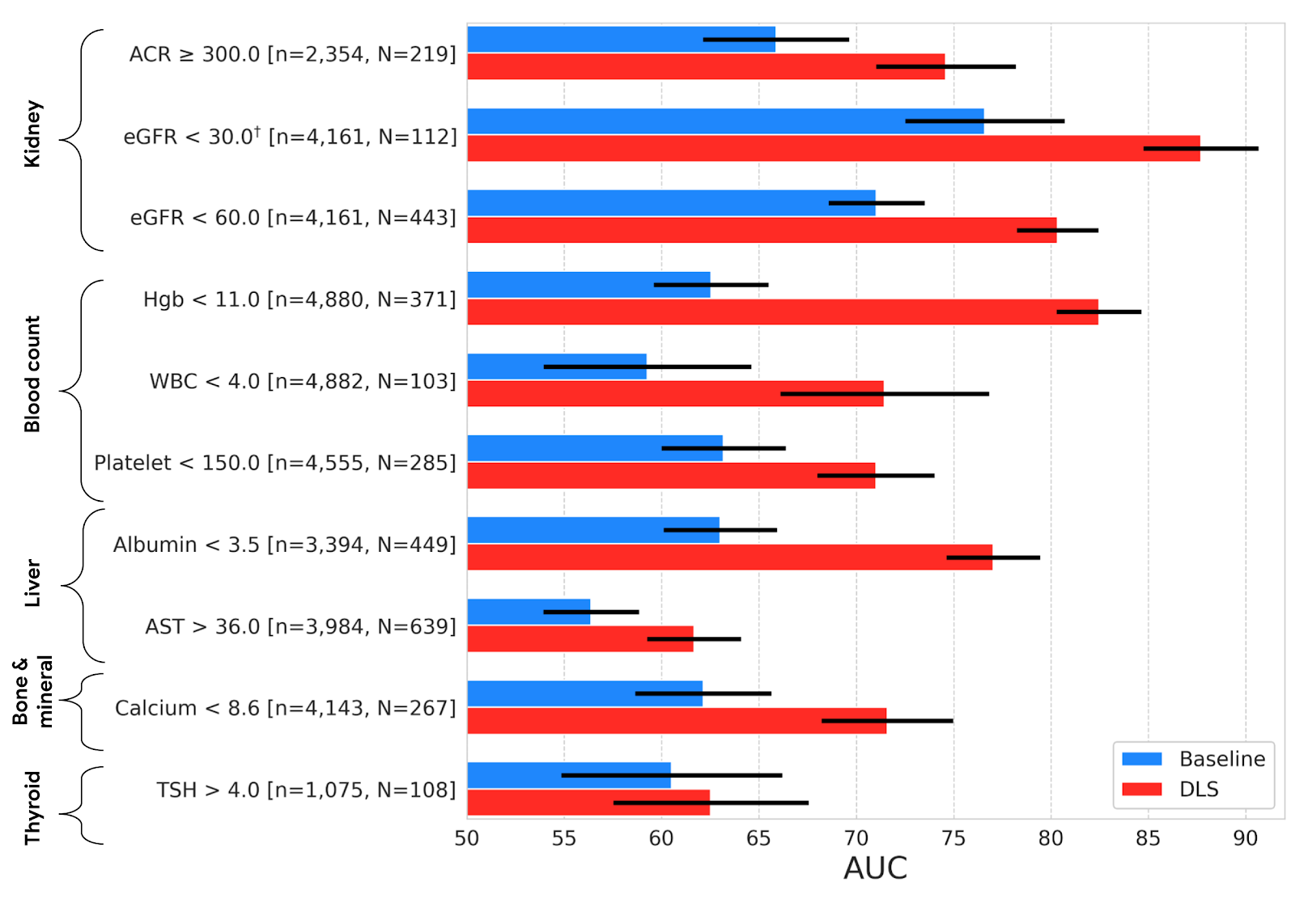AI Medical Applications
“Eventually, doctors will adopt AI and algorithms as their work partners. This leveling of the medical knowledge landscape will ultimately lead to a new premium: to find and train doctors who have the highest level of emotional intelligence.”
-- Eric Topol
AI for Healthcare
AI for Health is a philanthropic program launched by Microsoft, which aims to support nonprofits, researchers, and organizations working on global health challenges. The program provides access to artificial intelligence (AI) technology and expertise in three main areas:
- Population health
By integrating data from various health sectors and utilizing AI and visualization techniques, the program aims to offer decision-makers valuable insights into the factors driving diseases. - Imaging analytics
AI is applied to image-based data to improve clinical decision-making processes, extend the reach of imaging tools, and enhance their precision and accuracy. - Genomics and Proteomics
AI is utilized to analyze genomic and proteomic data. It can help predict disease risks and identify specific areas in proteins that require further investigation for potential disease intervention.
"Microsoft Research: AI for Health":
https://www.microsoft.com/en-us/research/project/ai-for-health/
Table of Contents
- Detecting Novel Systemic Biomarkers In External Eye Photos
- A Powerful New Neurotech Tool For Augmenting Your Mind (13:00)
- DermAssist: (1:49)
- Doctors Are Using A.I. In The O.R. (6:52)
- Top 5 AI Myths (6:45)
- Drug Discovery (13:31)
- Accelerating Clinical Trials with AI: (5:22)
- Companion Robots (20:19)
- Artificial Intelligence (AI) in Healthcare (6:10)
- 4 Ways Artificial Intelligence is Transforming Healthcare (9:40)
- The Dragon Ambient eXperience primary care encounter demonstration (10:26)
A deep learning model for novel systemic biomarkers in photographs of the external eye
- In a retrospective study published in the Lancet Digital Health, researchers found that multiple systemic biomarkers across various organ systems can be accurately detected from external eye photos with deep learning systems (DLS).
- The accuracy of the DLS model exceeded that of a baseline logistic regression model which used only clinicodemographic variables such as age and years with diabetes.
- To create the model, researchers collaborated with EyePACS and Los Angeles County Department of Health Services to build a dataset of external eye photos and measurements and used 31 lab tests and vitals to train classification “heads” for each lab and vital.
- Evaluation on development and test datasets showed that all but one of the nine prediction tasks performed by the DLS statistically outperformed its baseline model.
- The researchers also tested image resolution robustness by scaling images down to various sizes.
- More comprehensive data collection and evaluation on general populations are needed before considering clinical use of this technology.
- Researchers developed a deep learning system (DLS) to analyze external eye photos and predict a person’s diabetic retinal disease status, as well as elevated glycated hemoglobin, from these photos.
- The study, published in Lancet Digital Health, found that a number of systemic biomarkers spanning several organ systems (e.g., kidney, blood, liver) can be predicted from external eye photos with an accuracy surpassing that of a baseline model.
- Model performance was evaluated on two datasets, with AUCs ranging from 62% to 88%.
- Additionally, the model was tested for robustness to image resolution changes with promising results.
- Further research is needed before considering clinical use; specifically data collection for DLS refinement and evaluation on a more general population and across subgroups must be done before clinical application can be considered.
Prediabetes Risk Test: https://www.cdc.gov/prediabetes/pdf/Prediabetes-Risk-Test-Final.pdf
A deep learning model for novel systemic biomarkers in photographs of the external eye: a retrospective study: https://www.thelancet.com/journals/landig/article/PIIS2589-7500(23)00022-5/fulltext
The Future of Computation Is Connected With Your Brain
OpenBCI is an open source neurotechnology company. What we ultimately care about is not the brain, but the mind, consciousness, human cognition. In 2019, we will have computers that we are resonantly and subconsciously connected to, enabling empathetic computing for the very first time.
Disabled Man Uses a Remote Controller to Fly a Drone
Christian has repurposed dormant muscles from around his body for extended and augmented interactivity. All the code related to that virtual joystick will be open source so that you can implement it and improve upon it. Technology can empower disabled people. It can help create a better, more inclusive and accessible world.
Sentiment Analysis
42 positive sentences and 14 negative ones were identified.
GALEA: BIOSENSING + SPATIAL COMPUTING: https://openbci.com/
GOOGLE'S AI-POWERED DERMATOLOGY ASSIST TOOL
AIpowered Dermatology Assist Tool uses machine learning to help find answers to common derm conditions. When available, this tool will be accessible from your browser and cover 288 conditions. We're working to make it available to consumers on Google Search in the EU as early as the end of this year.
Sentiment Analysis
3 positive sentences, and 1 negative one were identified.
HOW GOOGLE AI IS TRANSFORMING HEALTHCARE
Last year at Google IO, we announced Google AI. It is a collection of our teams and efforts to bring the benefits of AI to everyone. Healthcare is one of the most important fields AI is going to transform. We are opening AI centers around the world.
CAN AI HELP DOCTORS PREDICT MEDICAL EVENTS?
Another area where AI can help is to help doctors predict medical events. We can quantitatively predict the chance of readmission 24 to 48 hours before earlier than traditional methods. It gives doctors more time to act.
Advance Medicine & Research With AI
Healthcare demands new computing paradigms to meet the need for personalized medicine, next-generation clinics, enhanced quality of care, and breakthroughs in biomedical research to treat disease. With NVIDIA, healthcare institutions can harness the power of artificial intelligence (AI) and high-performance computing (HPC) to define the future of medicine.
AI is creating new possibilities in healthcare, elevating the quality of care providers can deliver and giving the gift of time back to physicians to connect with patients.
Live Brain Surgery:
- Dr. Akshay Syal takes us to NYU Langone Health where new A.I. technology is diagnosing brain tumors in record time, which opens the doors to possible new life-saving treatments.
-
A.I. technology has drastically advanced and revolutionized many sectors of the medical industry, but perhaps none more than brain tumor surgery. With the help of artificial intelligence, surgeons now have more effective and reliable ways to diagnose, target, and treat different types of tumors which were once thought impossible by manual means alone.
The primary benefit of A.I.-assisted surgery is that it can more accurately identify, analyze and target tumors, reducing the risk of collateral damage to healthy tissue. This could lead to shorter incision time and improved patient outcomes. In addition, A.I.-assisted diagnostics are often able to detect tumors earlier than manual scans, allowing for an earlier start in treatment.
Top 5 AI Myths
- Myth 1: Shortcuts in AI Really Do Not Work
- Reality: Foundational Models: New Era of AI Generalists
- exceeds performance of other models
- Reality: Foundational Models: New Era of AI Generalists
- Myth 2: If It Isn't Deep Learning It Isn't AI
- Reality: dfferent ML techniques are used
- linerar regression
- decision treens
- random forests
- Reality: dfferent ML techniques are used
- Myth 3: AI Is The Answer, What's The Question
- Reality: data analysis is actually sufficient
- Myth 4: Sweet Spot Of AI: Cost Reduction
- Reality: AI enables competitive differentiation
- not free
- computing costs increase
- Reality: AI enables competitive differentiation
- Myth 5: AI Benefits Limited To Problem Trying To Solve
- Reality: can bolster to other parts of the company
MIT-IBM Watson AI Lab
https://mitibmwatsonailab.mit.edu/
HOW ACCELERATED COMPUTING CAN DISRUPT HEALTHCARE
Nvidia invented accelerated computing to tackle problems normal computers can not. The technology can be applied across the continuum of healthcare, but I am going to focus in on drug discovery. It takes about $2 billion worth of investment and over ten years to bring a single drug to market.
GENERATIVE AI FOR EARLY-STAGE DRUG DISCOVERY
Generative AI is going to bring that million X to drug discovery. It already is the new methods of being able to use language as the programming interface. It is really at the precipice of turning biology from a science to engineering.
Mount Sinai Predictive AI Flags Drugs That May Cause Birth Defects: https://healthitanalytics.com/news/mount-sinai-predictive-ai-flags-drugs-that-may-cause-birth-defects
HOW AI WILL CHANGE THE WAY WE TEST NEW DRUGS
How AI is going to fundamentally change how we test new drugs. He says modern clinical trials are facing some critical challenges. AI can make participating in trials much more accessible. And finally, AI can finally make drugs more effective by personalizing the treatment.
Sentiment Analysis
12 positive sentences and 8 negative ones were identified.
THE AI COMPANION WHO LIVES WITH AN ELDERLY PERSON
ElliQ is a companion AI robot that is designed to live with older adults. The goal is to alleviate the sense of loneliness and social isolation. Users build a relationship of trust and they really see her as a friend. Once we are able to achieve that, we can motivate them towards better aging.
A MACHINE TO CARE FOR YOU?
ElliQ will ask Marie if there was some information about her pain that could be shared with her person or her doctor. Early on we had to decide who matters. Who am I taking care of? The family, the entity that pays for this, the older adult. They are in control of their data.
IN THE ELEVATOR WITH ALGORITHMS
We are all about getting ElliQ into the hands of people that need it. We are working so we launched the product commercially a year ago after a lot of work. Call your congressman and ask them to make sure that your state or your Medicare Advantage provider is deploying it.
WILL YOUR AI COMPANION THE ELDERLY?
The public awareness now that we are going to build relationships with AI is real. 80% of customers have at least one family member that downloaded our companion app. We are trying to motivate people to live better, healthier lives. There are over 30 patents in the company by now.
SHOULD YOUR ELLIQ BE ABLE TO ASSIST YOUR GRANDMA?
We never go against the wishes of the older adult. We have no plans to make her move around the house. We are HIPAA compliant, so we need an agreement from every one of our partners. Design is super, super important. We want to make it delightful and easy to use.
A DAY OFF FOR THE HUMAN
Today is Tuesday, May 2. Is there anything special planned for today? No, I'm not doing anything today. Now she's in night mode. She's not going to talk to me at all during this period of time. You iterate and you improve.
Integrating Artificial Intelligence with Healthcare
Fewer hospitalization, lesser doctor visits, lesser number of side effects due to drugs. These are some of the positive outcome that we can expect when we integrate artificial intelligence with healthcare. What are the recent trends in 2022 where we have successfully integrated these two branches and we have seen great results?
What is Artificial Intelligence in Healthcare?
We have seen usage of artificial intelligence in all the sectors of healthcare, from diagnostic to treatment. Artificial intelligence can help in medical visualization. Augmented reality and virtual reality also have a role in patient experience. The healthcare ecosystem is facing a shortage of trained healthcare staff.
Artificial intelligence is taking the world by storm, and its impact will be felt in all corners of society, including medicine. Is AI in healthcare a good thing or something to be wary of? Here are four ways AI is transforming the medical field.
- PATIENT CARE: AI is changing medicine by assisting with diagnosing and treating patients. AI also has the powerful potential to predict the occurrence and progression of chronic diseases.
- RESEARCH: AI is furthering medicine by transforming the way medical research is conducted, particularly in clinical trials.
- ADMINISTRATIVE TASKS: AI can streamline administrative tasks in healthcare, and by reducing the burden of these tasks, it can help prevent physician burnout.
- MEDICAL EDUCATION: AI is quickly being integrated into medical education at all levels of training. Integrating AI into formal medical curricula can prepare future physicians for AI's increasing role in healthcare.
AI has huge potential to revolutionize many facets of healthcare, but with any change, we should be cognizant of the possible biases we could be introducing. AI, after all, is designed and programmed by humans, so it’s susceptible to the same biases we are.
AI in Healthcare: How Artificial Intelligence is Transforming Medicine:
https://medschoolinsiders.com/pre-med/artificial-intelligence-in-healthcare/


